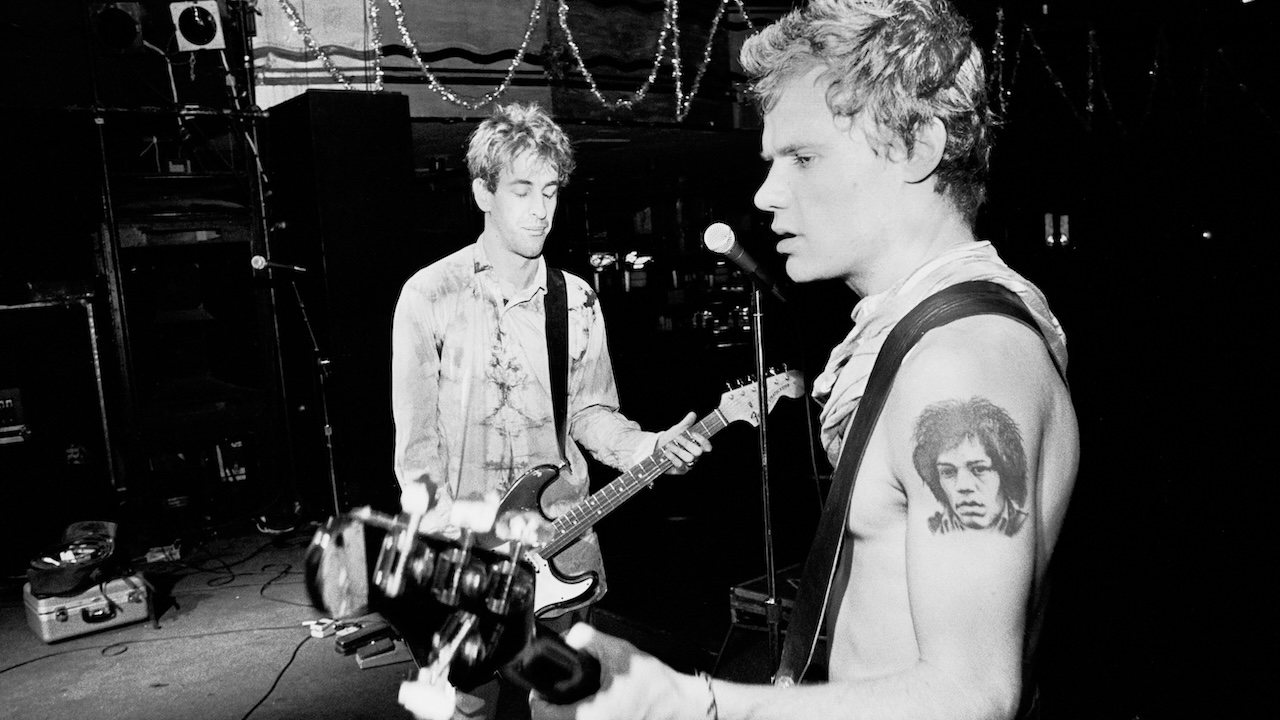Classic Rock Investigates: Rock Fights Back!
It's in the charts. It's on the radio. Why your music matters again

Select the newsletters you’d like to receive. Then, add your email to sign up.
You are now subscribed
Your newsletter sign-up was successful
Want to add more newsletters?

Every Friday
Louder
Louder’s weekly newsletter is jam-packed with the team’s personal highlights from the last seven days, including features, breaking news, reviews and tons of juicy exclusives from the world of alternative music.

Every Friday
Classic Rock
The Classic Rock newsletter is an essential read for the discerning rock fan. Every week we bring you the news, reviews and the very best features and interviews from our extensive archive. Written by rock fans for rock fans.

Every Friday
Metal Hammer
For the last four decades Metal Hammer has been the world’s greatest metal magazine. Created by metalheads for metalheads, ‘Hammer takes you behind the scenes, closer to the action, and nearer to the bands that you love the most.

Every Friday
Prog
The Prog newsletter brings you the very best of Prog Magazine and our website, every Friday. We'll deliver you the very latest news from the Prog universe, informative features and archive material from Prog’s impressive vault.
Rock music in 2015 – it’s over, isn’t it? That’s what everyone’s been saying. The album’s dead. No one goes to gigs any more. Downloading and streaming have killed sales. Rock clubs are closing down. The singles chart is going the way of the dinosaur.
Yet something else is going on here, a story that no one is telling. It may be slightly obscured by the way in which we now measure success – those simple days of record companies sending countable physical products to stores that sold them really are gone forever – but take a look around and there’s no denying that rock music is fighting its way clear of the fog and back into a rude state of health.
It’s always been there. Like an iceberg – massive beneath the surface – it’s only when the water level around it drops that the wider world gets to see it. And how the water level is dropping. Last November, when Taylor Swift’s album 1989 became the first to go platinum (sales of 1m) in 2014 in America, Forbes business magazine asked: ‘Is this the last platinum album ever?’ As there had been just five in 2013, the question was valid. But compare that figure to the gory, glory year of 1988, when the platinum certifications included the usual suspects: Guns N’ Roses, Def Leppard, Bon Jovi, Poison, Van Halen, Whitesnake; but also Britny Fox, Dokken, Stryper, Lita Ford… Back then a platinum album was what a decent, mid-range rock band achieved.
It would be a stretch to call what is happening now a return to that era, but the intimations of something new and important have been there for a year now. There have been Top 15 albums from AC/DC, Black Stone Cherry, Black Star Riders, Rival Sons (below), Thunder, Nightwish, Steven Wilson, The Prodigy and, by the time you read this, you can probably add Halestorm to the list.

It’s not just albums, though. There are massive summer festival headline slots from The Who, Foo Fighters and Metallica. And Fleetwood Mac are doing more shows at the O2 than Olly Murs. Even venerable Wembley Stadium is back in the safe hands of rock after a couple of fallow years. “It has been a real roller-coaster,” Jim Frayling, the north London venue’s head of business development – music and new events, told Music Week recently. “Two years out we thought we’d have a stellar year. Early last summer we had nothing. Now we’re chuffed to bits.” Yes, there may be three shows scheduled for Ed Sheeran, but the venue will also play host to AC/DC and two Foo Fighters gigs.
What’s obvious is that rock bands of all sizes and all ages, heritage acts and new-bloods, classic sounds to cutting edge, are out there and doing it, whether that’s working directly with their core, long-standing fans or hitting the mainstream summer crowds. While there’s no shared musical style across such a range of bands, or much in common between the fans of say Steven Wilson and Nightwish, there are threads that join them all. “It’s about loyalty and respect,” says Thunder singer Danny Bowes, who has just enjoyed a Top 10 album – a No.9 hit, in fact – with the group’s tenth studio record, Wonder Days. It was Thunder’s third Top 10 record overall, and their first since 1995.
“We’ve never taken our audience for granted, and we’ve always tried to treat them fairly,” he says. “We’ve kept our ticket and merch prices lower than most. We try not to forget they always have a choice how they spend their money.”
Sign up below to get the latest from Classic Rock, plus exclusive special offers, direct to your inbox!
Bowes has tapped into an eternal truth: what is making and keeping rock music vibrant in the sea-change years for the industry is this deep connection with its fans. And it’s a connection that technology can actually aid, rather than inhibit. Whether a band chooses to work with a record company or go the direct route and crowd-fund, the link between them and their customers is far stronger now than in the pre-internet days. This isn’t just true of established bands with estabished fan bases – new rock artists know how to play the new media game, and the successful ones establish a direct route to their fan base from the word go. And what rock fans want, as Thunder, Black Star Riders, Steven Wilson, Rival Sons, Halestorm and many more have discovered, is a relationship that allows them to be discerning and choose the type of product or ticket they’d like to buy, whether that be a deluxe, limited-edition version of a new record, or a meet-and-greet show package, or, as Marillion do bi-annually, entire residential weekends devoted to live gigs. As part of this relationship, the bands are giving a commitment to offering quality music, rather than, as sometimes used to happen, albums made to fulfil record company contracts and to hit release schedules.
“You have to make the best album, with the best songs you can write,” says Bowes. “Fans pay the bills. If they tell you there’s something wrong, you should put it right asap.”
That’s not necessarily a sentiment you would have heard someone like Mötley Crüe singer Vince Neil uttering circa 1989. But, whether stated explicitly or not, rock music has always been about the union of artist and fan. It’s a sacred thing. Those outside of the circle don’t experience it, and so when bands aren’t having ‘hit’ singles or making headlines in the papers, they think that the music has somehow died. To fall for that line is to agree that music is as disposable as fashion. The new climate around rock’n’roll proves that it is not.
“Chart positions are really only an indicator, a way to measure sales of one album against another, on any given week,” says Bowes. “That said, I think perceptions are definitely influenced by chart positions, and positive perception changes play a part in stimulating sales. Did a lot of people get very excited about our chart position? Yes they did. Did I order a new car as a result? No I didn’t.”
But if rock music is seen in the charts, irrespective of whether they have the power and influence of yesterday, it feeds excitement. When our music gets in the charts it has more chance of being on the radio. Success breeds success. Royal Blood’s sudden impact (300k-plus sales) gives others the impetus that all is not lost in starting a rock band. There is potential to break through. And if not in the traditional massive hit single route, then do it the Rival Sons way. Their quiet, steady success is encouraging – hard graft has led to high-profile TV slots, airplay on national radio, a recent sell-out of the Roundhouse… It shows it’s still possible.
So while all these artists’ new motors may be on hold, and it’s fair to say that chart positions now are no longer the same indicator of commercial success that they were two decades ago, rock music continues to offer an authentic experience. In an age where so much feels artificial and made-for-TV – or made-by-TV – that is why it continues to thrive. It’s real. And people are taking notice.
Chart Busters!
The rock bands taking on pop – and winning
Halestorm
New album Into The Wild Life found the US band amping up the pop without losing their hard-rock nous – and being rewarded a massive UK hit. A quantum leap for rock circa 2015, especially considering their previous albums didn’t even make the UK Top 40.
Black Star Riders
From Thin Lizzy side project to full-blown ‘proper band’, Black Star Riders clearly won over a lot of people with this year’s second album, The Killer Instinct. Enough for it to hit No.13 in its first week, no less.
Steven Wilson
Porcupine Tree founder, prolific player elsewhere and now Top 10 solo, Steven Wilson brought progressive rock into the 21st century with his fourth solo album, Hand. Cannot. Erase. An impressive mainstream move for someone who only last year was remixing Gentle Giant.
Thunder
It’s a little ironic that an album waxing lyrical about the good old days - the aptly-titled Wonder Days - should make such waves in the present-day charts. “It would appear we are very much back!” said frontman Danny Bowes, as Wonder Days went to No.9. Well, quite.
Rival Sons
Last year’s Great Western Valkyrie earned them 10⁄10 from Classic Rock, and a No.14 spot in the UK album chart. Proof that classic rock sensibilities can still be cool and current.
Jon Hotten is an English author and journalist. He is best known for the books Muscle: A Writer's Trip Through a Sport with No Boundaries and The Years of the Locust. In June 2015 he published a novel, My Life And The Beautiful Music (Cape), based on his time in LA in the late 80s reporting on the heavy metal scene. He was a contributor to Kerrang! magazine from 1987–92 and currently contributes to Classic Rock. Hotten is the author of the popular cricket blog, The Old Batsman, and since February 2013 is a frequent contributor to The Cordon cricket blog at Cricinfo. His most recent book, Bat, Ball & Field, was published in 2022.

